- BlackVoter.Org
- Posts
- BlackVoter.Org
BlackVoter.Org


In honor of Black History Month, the University of North Dakota (UND) shines a light on its rich legacy through a captivating collection of photographs that capture pivotal figures and events in its history. From James Hilyard, the first student of color at UND, to pioneering journalist Era Bell Thompson, and the civil rights hero Ronald Davies, each image tells a story of resilience and achievement.
The webpage highlights key moments, including a historic phone call with Martin Luther King Jr. and a civil rights march on campus in 1965, showcasing UND’s commitment to social justice.
Additionally, UND invites the community to a Black History Month observance featuring an engaging chat with influential figures in aviation. Dive into a celebration of the powerful impact and contributions of Black individuals at UND, reminding us of the ongoing journey toward equity and inclusion.

In a captivating exploration of political progress, GrioNews highlights the most influential Black politicians in American history, showcasing their remarkable journeys against systemic barriers. From Hiram Revels, the first Black senator, to groundbreaking figures like Shirley Chisholm, the first Black woman in Congress, these leaders have reshaped U.
S. politics.
The article also honors the legacies of John Lewis, a civil rights titan; Kamala Harris, the first Black female vice president; and Barack Obama, the nation's first Black president, whose leadership inspired millions. Each profile emphasizes the resilience and contributions of Black politicians in advocating for civil rights, gender equality, and social justice.
Their legacies are a testament to how activism and relentless pursuit can change the political landscape, proving that the fight for representation and equality is ongoing.

The Arizona State Press shines a spotlight on remarkable figures in Black history who have profoundly impacted society. From the 18th-century voice of Boston King, a former slave and Methodist preacher who documented his harrowing experiences, to the 19th-century visionary Frances Joseph-Gaudet, who advocated for prison reform and education for marginalized youth, these stories reveal the rich tapestry of African American contributions.
The article also highlights Fannie Lou Hamer's fierce fight for voting rights during the civil rights movement and current civil rights attorney Benjamin Crump, known for his high-profile cases against systemic racism. These influential figures remind us of the importance of recognizing diverse narratives and the ongoing fight for equality.
With events and educational programs at Arizona State University, readers are encouraged to engage with this essential aspect of American history. Through these stories, we gain perspective on the relentless struggle for justice and the indelible mark these leaders have left on society.

In a scathing op-ed, Barrington Salmon argues that Governor Ron DeSantis poses a significant threat to Black Floridians, accusing him of exploiting racism for political gain. Under DeSantis's leadership, the ACLU claims there has been a deliberate effort to undermine the rights and well-being of Black citizens, from stifling voting rights for formerly incarcerated individuals to attempting to erase Black history from classrooms.
The article highlights how DeSantis’s actions echo the oppressive tactics of the Jim Crow era, sowing distrust and suppressing Black voices in various settings. With the governor seeking to solidify his support among white voters for a potential presidential run, Salmon warns that Florida’s Black community is endangered amid a resurgence of racial hostility and division.
The piece serves as a crucial reminder of the ongoing struggles against systemic racism and the need for vigilance in defending civil rights.

In a heated escalation of rhetoric, former Trump advisor Steve Bannon has unleashed a barrage of criticism against Elon Musk, branding him a “parasitic illegal immigrant” and questioning his influence on the U.S.
government. Bannon alleges that Musk's presence undermines American values and customs, particularly targeting Musk's role in the newly formed Department of Government Efficiency (DOGE).
Musk, who has become a significant player in Trump’s administration since his endorsement in 2024, dismisses Bannon's claims as “politically motivated” attacks. Bannon's comments not only challenge Musk's immigration status but also hint at racial bias, sparking backlash over their divisive nature.
As the debate simmer over Musk's rising influence and the effectiveness of DOGE, it underscores the larger tensions surrounding corporate power in politics—highlighting the consequences of aligning business with governance in a polarized landscape.

In Georgia's intense midterm elections, the spotlight is on the state's contentious voting laws, stirring up significant debate about accessibility and fairness. With pivotal races for a Senate seat and the governor's mansion at stake, tensions are high as Democrats criticize recent legislation that they believe limits voting access for minorities, citing restrictions on drop boxes and stricter ID requirements for mail-in ballots.
This discontent has prompted major companies, including Coca-Cola and Delta Airlines, to voice their concerns. President Biden even drew parallels to Jim Crow laws, dubbing the situation “Jim Crow 2.
0.” Regardless, early voting turnout has surged, with over 131,000 Georgians participating on the first day alone, nearly matching the last presidential election.
As both sides prepare for potential disputes, the question remains: can the increased participation overshadow the allegations of voter suppression? The outcome of this electoral showdown could reshape the future of voting laws in Georgia.

During a lively Black History Month celebration at the White House, President Trump praised the contributions of Black Americans, expressing gratitude for their support in his electoral success. Welcomed by notable figures like golfer Tiger Woods and Senator Tim Scott, Trump emphasized the significance of honoring historical Black figures, including Prince Estabrook, the first African American soldier in the Revolutionary War.
He announced plans for a statue of Estabrook in the National Garden of American Heroes, which will also feature icons like Harriet Tubman and Martin Luther King Jr. Despite the event's cheerful atmosphere, it contrasted sharply with ongoing controversies regarding Trump's moves to dismantle diversity, equity, and inclusion initiatives, raising concerns about the future of Black history education.
Nonetheless, the audience enthusiastically supported Trump’s call for continued collaboration and progress, chanting for “four more years” as he touted his administration’s achievements.